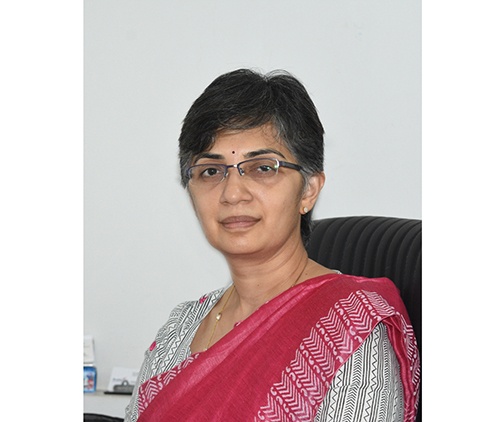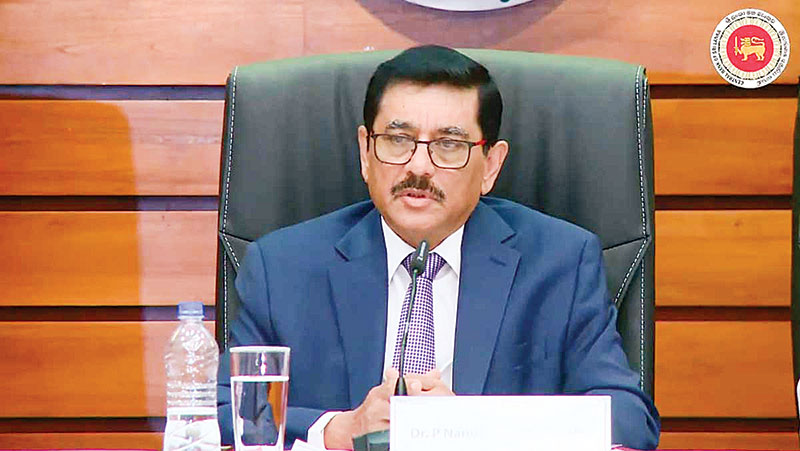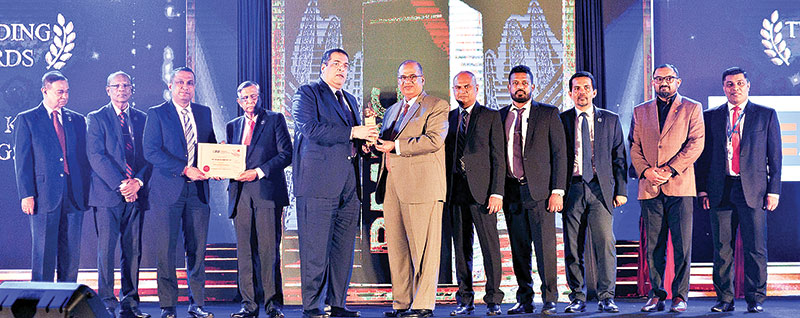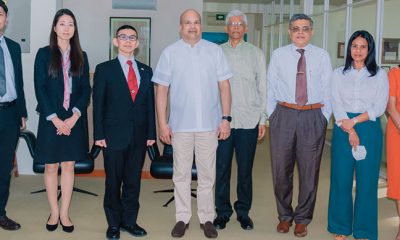Business
COVID 19 and diabetes: a lethal partnership? How do we overcome this?

By Dr. Kayathri Periasamy
With the latest wave of COVID-19 infections sweeping steadily across Sri Lanka, attention has been directed towards persons with uncontrolled, pre-existing conditions, particularly diabetes; as a sect most vulnerable to get severely ill or die because of complications caused by the virus. This has shed light on another growing concern among healthcare providers and patients, which is that patients suffering from diabetes or other chronic conditions are finding it increasingly difficult or are unable to access the medical care they require due to mandatory albeit essential curfew measures combined with a deep fear of contracting the virus in communal healthcare settings.
With a staggering 463 million adult diabetic patients present worldwide, World Diabetes Day 2020 – falling on the 14th of November- is a critical time for diabetes support communities and healthcare advocates to rally together to create awareness about this debilitating medical condition and push for progress in the standards of care and the better management of diabetic patients during a pandemic. In Sri Lanka alone, 1 in 10 adults are approximated to suffer from the disease. It is also then vital to look at ways to help stop more people from getting this disease, particularly at a time when ‘lockdown’ lifestyles are more often than not likely to be sedentary, unhealthy and stressful; an ideal background for a diabetes diagnosis.
Why is uncontrolled diabetes such a potent accelerant for COVID-19?
A recent study conducted by Lancet on Diabetes & Endocrinology screened over 61 million medical records in the U.K. to find that 30% of COVID-19 deaths can be attributed to people with diabetes. After accounting for factors such as demography and chronic medical conditions, the risk of succumbing to the virus was shown to be about three times higher for people with Type 1 diabetes and almost twice as high for Type 2, versus those without the disease.
There appears to be two primary reasons driving this predicament. Over a lifetime, poor glucose control inflicts widespread damage in our systems which can lead to strokes, heart attacks, kidney failure, eye disease, and limb amputations. The linings of blood vessels throughout the body weaken to an extent where they can’t ferry necessary nutrients adequately. Inflammation is another byproduct of poor diabetes control, which makes the body ill-prepared for the onslaught of the viral disease. Secondly, the rich environment of elevated blood glucose present in diabetic patients, makes them prone to superadded bacterial complications during the viral infection. Many diabetics also tend to have other co-morbidities such as obesity, hypertension, and heart disease, which are all factors that aggravate complications during viral illneses. These problems are seen in any infections in the setting of diabetes and not only with COVID 19. The pandemic has just highlighted the difficulties of having diabetes
What precautions can diabetic patients take?
So during this pandemic, apart from strict adherence to general COVID-19 personal safety protocols such as strict social distancing and sanitization, it is important for patients to regularly monitor their glucose levels to avoid complications caused by fluctuating blood glucose. Proper hydration is essential for good health. It is also crucial to have access to a good supply of the prescribed diabetes medications and healthy food so that patients are able to correct the situation if blood glucose levels fluctuate. Finally, sticking to a comfortable daily routine, maintaining an exercise program even within the confines of your home, reducing excessive work and having a good night’s sleep can go a long way in keeping you strong. In essence, maintaining good blood sugar levels may be their best defense against severe COVID-19.
Disruption to continuity of care for diabetes patients
A rapid assessment survey conducted by WHO among Ministries of Health across many countries, focusing on the service delivery for NCDs during the COVID-19 pandemic, revealed deepening concerns that many people living with NCDs are no longer receiving appropriate treatment or access to medicines during the COVID-19 pandemic. The more severe the transmission phase of the COVID-19 pandemic, the more NCD care services were disrupted.
With our country currently in the cluster transmission phase and heading towards the community transmission phase due to the large and distant spread of the first-line contacts, the threat to NCD care and especially routine and emergency care of diabetes patients worries us physicians. As healthcare providers, we too are torn between the dilemma of not wanting to expose our patients to unnecessary hospital visits and the need to ensure that all our patients have continued access to their healthcare team along with a steady supply of medicines and other diabetes care products such as glucometer strips and insulin. Unfortunately, the delay in visiting their healthcare provider when they have symptoms of complications has caused many people to present late to the hospital with heart attacks or infections. A delayed presentation, weakens the patient further.
This disruption to healthcare services is foreseen to be a huge dilemma for patients and healthcare providers alike, especially when it comes to the care of patients with diabetes and other non-communicable diseases. In Sri Lanka, the Ministry of Health, is currently providing a number of telemedicine services and has opened avenues to deliver medicines to houses without diabetic persons having to visit crowded settings
How do we counter this?
At Healthy Life Clinic, we adhere strictly to COVID-19 safety operational health protocols established according to Ministry of Health (MOH), Epidemiology Unit. All incoming patients are screened by our nurses as soon as appointments are made over the phone, to understand the nature of their illness. If there is a worry that they could have contracted COVID-19 or have been in contact with such patients, they are given the opportunity to speak to the doctor first over the phone for a detailed history. Every patient will be consulted and no one is turned away from our care.
In order to help patients overcome barriers such as curfews or even the fear of entering communal healthcare settings, our experienced, highly-regarded team of consultants conducts telehealth consultations via established, trusted telemedicine partners such as oDoc and Mydoctor.lk to maintain continuity of care throughout this pandemic. We have also moved many of our long-standing diabetes care and weight management programs online, which have proven to be effective even in the absence of a physical meeting and examination. Additionally, our social media platforms and website are constantly updated to increase awareness about this condition, along with content that informs people about the proper management and prevention of diabetes – particularly when it is thus connected to COVID-19.
(Dr. Kayathri Periasamy is a consultant physician MBBS (UK), MRCP (UK), Board Certified in Int. Medicine (U.S.A). She is the founder of Healthy Life Clinic, Colombo 07.)
Business
Human-elephant conflict mitigation efforts intensify

The Sri Lankan government has intensified its efforts to mitigate human-elephant conflicts and reduce elephant fatalities, allocating substantial funds in the 2025 budget for elephant conservation. The Department of Wildlife Conservation (DWC) has introduced a range of targeted measures, emphasizing public participation and localized interventions.
Recognizing the critical role of local communities, the government has launched awareness programs in high-risk Grama Niladhari divisions. By 2025, 23 villages have been identified for intervention, with 43 awareness programs planned. These initiatives aim to educate residents on coexistence strategies and reduce human casualties.
To physically deter elephants from entering villages, authorities are fast-tracking the construction of electric fences and the establishment of watch posts. The Civil Security Force will play a key role in these operations, enhancing protection through continuous monitoring and rapid response mechanisms.
In response to the alarming rise in illegal elephant killings, the government has reaffirmed its commitment to enforcing the Flora and Fauna Protection Ordinance. The Department of Wildlife Conservation has warned that perpetrators who engage in poaching or use firearms and explosive traps will face severe legal consequences, including criminal prosecution and heavy penalties.
Commenting on these developments, Ranjan Marasinghe, Director General of the Department of Wildlife Conservation, stressed the urgency of the situation:
“Sri Lanka’s wild elephant population is an invaluable national asset and balancing conservation with human safety is a top priority. Our latest initiatives integrate community-driven solutions with stronger legal enforcement to ensure the long-term survival of elephants while protecting human lives.”
Manjula Amararatne, Director of Protected Area Management, emphasized the department’s proactive stance:
“By enhancing physical deterrents such as electric fences and engaging local communities in conservation efforts, we are creating sustainable solutions to minimize conflicts.”
Meanwhile, U.L. Taufiq, Deputy Director (Elephant Conservation), stressed the role of law enforcement:
“Illegal elephant killings must stop. We are working closely with the judiciary to ensure those responsible face the full extent of the law.”
by Ifham Nizam
Business
Central Bank vows trickle-down relief to the people

Dr. Nandalal Weerasinghe, Governor of the Central Bank of Sri Lanka, assured on Wednesday that a systemic economic “trickle-down” effect would create new employment opportunities, generate greater economic dividends, and provide better government services to the people, among other benefits.
The Governor’s remarks came in response to a question posed by The Island Financial Review:
The Island: “Governor, Sri Lankan banks have reported robust profits and strong balance sheets, yet ordinary citizens remain trapped in a daily struggle for survival. At a recent business forum, a prominent banker argued that the ‘trickle-down effect’ would eventually alleviate public hardship. Do you agree with this theory, and if so, when will Sri Lankans actually feel relief in their lives?”
Governor: “The banking sector’s return on equity aligns with sustainable business practices. The banking industry, like tourism, manufacturing, or any other sector, must generate reasonable profits to survive and expand. This profitability is not unique to banks; it is a prerequisite for broader economic recovery. During the crisis, many sectors collapsed, but banks could not afford losses, as public trust hinges on their stability. Had banks failed, depositors would have panicked, triggering a bank run. We instructed banks to prioritise stability while accepting modest profits during the worst of the crisis. Their current profits remain disproportionate compared to other sectors. As the economy strengthens, recovery will generate jobs, dividends, and services, enabling the trickle-down effect to reach all citizens.”
The Governor made these remarks during the Q&A session following the second Monetary Policy Review for the period up to March 2025.
When asked whether the Central Bank was intervening to safeguard the rupee, the Governor replied, “We have been purchasing US dollars—we buy dollars from the market.”
On foreign exchange supply and demand, he stated, “It fluctuates daily for various reasons. In February and March 2024, we observed foreign inflows into government securities. Meanwhile, exporters and the remittance sector are performing well. Import demand remains stable at healthy levels. Thus, there is a ‘nice balance’ between foreign exchange inflows and outflow.”
According to the Review, rupee liquidity remains in surplus, and market interest rates continue to decline in line with the eased monetary policy. Credit flows to the private sector remain robust, supported by low interest rates. The Central Bank expects this trend to continue, bolstering domestic economic activity.
The Governor also noted that car import orders received thus far total approximately USD 200 million.
Authorities had initially projected USD 1 billion would be required to meet the car import demand after an import ban that lasted nearly 5 years and that would help accrue significant amount of taxes to the Treasury.
By Sanath Nanayakkare
Business
CEAT Kelani reaffirmed by CPM as one of Sri Lanka’s best-managed companies

CEAT Kelani Holdings has been adjudged the best-managed tyre manufacturing company in Sri Lanka and reaffirmed as one of the top 20 companies in the country for best management practices, by the Institute of Chartered Professional Managers (CPM) Sri Lanka.
The company received the Category Award in the ‘Tyre, Rubber, Metal & Wood Furniture’ sector at the 2025 edition of CPM’s ‘Best Management Practices Company Awards’ in addition to the Top 20 award presented at the awards gala. This is the second consecutive year that CEAT Kelani was recognised as one of the best managed companies in Sri Lanka.
The CPM awards honour the best practices in management in terms of leadership, policies and strategies, people management, partnerships & resources, processes and performance.
“Awards of this nature will encourage us to strive for even greater heights in management practices, adopting global best practices in aligning strategic direction with a people-centric approach,” CEAT Kelani Managing Director Ravi Dadlani said. “We have already shattered the stereotype for large-scale manufacturing operations and are considered a case study for a successful privatisation of a state-owned enterprise, with unprecedented achievements in productivity, product development, deployment of new technology, research and development, market leadership, sustainability and good corporate citizenship.”
He said CEAT Kelani has transformed from an “inside-out” company to an “outside-in” organisation, placing customer and market centricity at the core of everything it does. This shift is reinforced through regular market visits by employees at all levels, including management, shop floor staff, and all business functions.
-

 News6 days ago
News6 days agoSeniors welcome three percent increase in deposit rates
-

 Features6 days ago
Features6 days agoThe US, Israel, Palestine, and Mahmoud Khalil
-

 News6 days ago
News6 days agoScholarships for children of estate workers now open
-

 News7 days ago
News7 days agoDefence Ministry of Japan Delegation visits Pathfinder Foundation
-

 Foreign News4 days ago
Foreign News4 days agoBuddhism’s holiest site erupts in protests over Hindu ‘control’ of shrine
-

 News6 days ago
News6 days agoJapanese Defence Delegation visits Pathfinder
-

 Editorial7 days ago
Editorial7 days agoWhen promises boomerang
-

 Features3 days ago
Features3 days agoCelebrating 25 Years of Excellence: The Silver Jubilee of SLIIT – PART I











